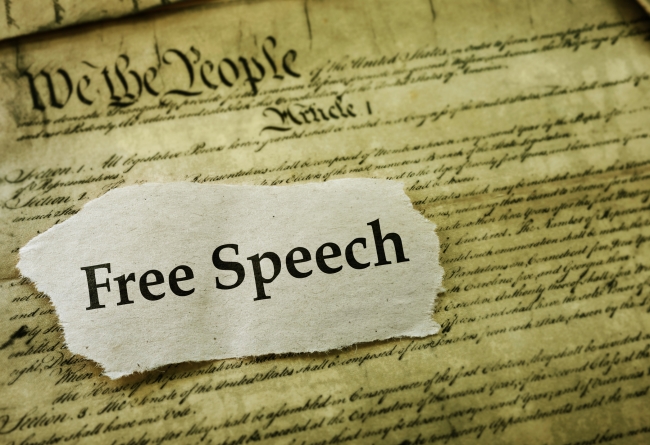You have /5 articles left.
Sign up for a free account or log in.

zimmytws/iStock/Getty Images Plus
It has been, by every measure, a challenging year for free speech on college campuses.
Widespread student protests, legislative efforts to control what is taught and how, and a growing movement to suppress diversity, equity and inclusion programs have created a crisis not seen since the Vietnam War and civil rights protests more than half a century ago. In the process, university leaders have been caught in the crossfire between faculty, students, alumni, parents, donors, trustees, advocacy organizations and members of Congress.
While fundamental commitments to free speech and academic freedom remain strong within our institutions, students and faculty alike are increasingly unclear about what is protected, and at what cost. When does protected political speech cross the line into unprotected threatening or intimidating speech? How should private institutions, not subject to First Amendment restrictions, make these distinctions? Can faculty include controversial materials in their courses when some students say it makes them feel unsafe? How do we respond to students demanding that we cancel speakers whose views they regard as abhorrent, but who are outraged when their own right to speak or demonstrate is challenged?
These questions about the scope of free speech are not new, but the context in which we now confront them is unprecedented. We live in a time of intense political polarization and the pervasive—and increasingly pernicious—influence of social media, when some academic discourses are themselves politically controversial, and when society at large is suspicious of higher education. Students entering and returning to college this fall will be thrown into this maelstrom. We have not prepared them well.
If these past months have taught us anything, it is that we need greater clarity than ever before on what types of speech and protest are permitted, which are disallowed, and why, as well as greater transparency about how our institutions deal with the many boundary cases that inevitably arise. Addressing these challenges will require administrators to take a concerted, multifaceted approach.
Every student should receive a booklet when they arrive on campus outlining basic principles of free speech and campus protest. It should explain why free speech is the bedrock of academic inquiry and include clear examples of the sorts of speech that are protected (even when they are offensive), the types of behavior that are not tolerated and the kinds of sanctions that can be imposed when the rules are violated. It must also acknowledge that in many cases no bright line can be drawn and explain how such cases will be adjudicated.
The need for such explicit guidance was underscored by the results of a recent student survey from the Foundation for Individual Rights and Expression, according to which 45 percent of students indicated that blocking other students from attending a speech is acceptable to some degree, and 27 percent said that using violence to stop a campus speech is acceptable to some degree. Students need to be disabused of these misguided views.
New student orientation should include programming on these issues, focused on cases that require careful discernment. One such example was offered recently by David Wippman, who just retired as president of Hamilton College: “If someone is chanting, ‘From the river to the sea’ at 4 p.m. on a Friday in the middle of a quad where protests are allowed, that’s protected speech. If they’re chanting it at 4 a.m. outside a Jewish student’s residence hall room, that’s harassment.”
Colleges should sponsor programs throughout the year in which issues of free speech are examined, featuring experts on First Amendment law, social protest movements and higher education policy. These programs should be open to faculty, students and staff.
Institutional leaders should communicate regularly, especially at high-profile public events, about the importance of listening to the viewpoints of those we disagree with, about the fact that academic work sometimes challenges our cherished beliefs and about the value of civil discourse, both on campus and in society. To protect the free speech of everyone in our communities, campus leaders will need to model it consistently and vigorously.
Universities should sponsor a series of facilitated conversations with leaders of student groups about how free speech principles apply to their activities, both internally and in relation to groups with conflicting views and agendas. Students should be challenged to interrogate what it means to ensure their safety, recognizing that there are significant differences between behaviors that make students uncomfortable, those that create a toxic learning environment and those that threaten someone’s physical safety.
Faculty members should receive clear and explicit guidance from the administration about political speech that is protected, both inside and outside class, and what is out of bounds. Recognizing again that many cases fall into a gray area where the administration will be required to make judgment calls, faculty should receive guidance about who is responsible for such judgments, and how faculty can appeal these decisions.
In addition, regular faculty workshops should be offered on how to handle controversial issues that arise in class discussions. Faculty should be encouraged to add messages to their syllabi about principles of civil discourse, open dialogue and respectful communication, based on templates provided by university leadership, to ensure that these messages are aligned with campus policies and consistent across courses.
In short, if we want free speech, we’ll need to teach it—intentionally, consistently and forcefully—as if the education of our students and the well-being of our institutions depend on it. Because they do.
In addition to these educational strategies, we must establish institutional structures that address these issues. It is long past time for universities to establish standing committees composed of faculty, students and institutional leaders where policies on these matters are debated in an open, collaborative and transparent setting. Such committees should periodically produce reports about their deliberations and any recommendations they would make for adjustments to institutional policies.
Doing so would serve several purposes: fostering greater consensus on the value and limits of free speech, giving students a voice in policy-setting, and providing much-needed credibility and support to academic leaders when they take disciplinary action. Finally, such a process would help prepare students to address complex speech issues our society faces, such as whether and how to limit disinformation disseminated through social media and whether public libraries should remove materials that offend some people’s sensibilities.
This summer, university leaders have a window in which to rethink their approach to these issues. Doing so isn’t only about lowering the temperature on campus, urgent as that is. It is essential to reinforcing the values intrinsic to liberal education and reasserting the value of higher education to a skeptical public. This will require creative thinking, dedication, widespread buy-in and, of course, more resources.
Rising to the challenge of this moment will be costly in both time and resources, but so is failing to act decisively. Students and faculty alike must be helped to see how their own treasured rights to free speech are inextricably intertwined with the identical rights of those whose speech they find offensive, even abhorrent. And they must be taught that all such rights are accompanied by obligations that include, at a minimum, the responsibility to exercise those rights in ways that don’t undermine our educational mission or destroy the fabric of our society. The future of our institutions, and our democracy, depends on it.








